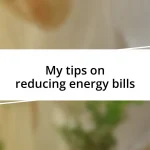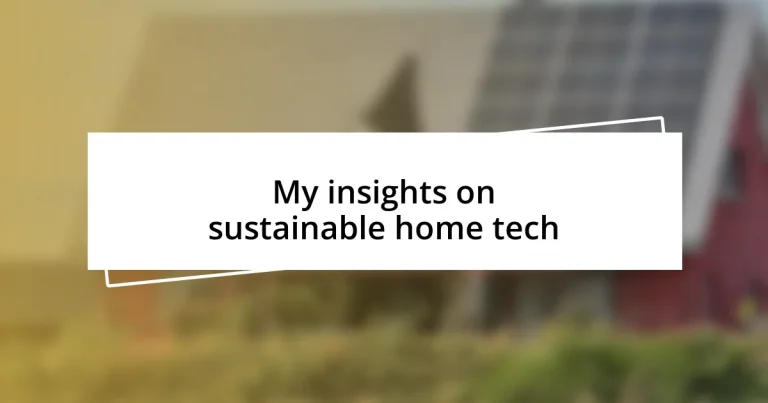Key takeaways:
- Sustainable home technology, such as solar panels and smart thermostats, empowers homeowners to reduce energy costs and environmental impact.
- Smart home devices enhance convenience and sustainability by enabling efficient management of energy consumption and resource usage.
- Incorporating renewable energy sources and engaging family in eco-friendly practices fosters a collective shift towards sustainability and waste reduction.
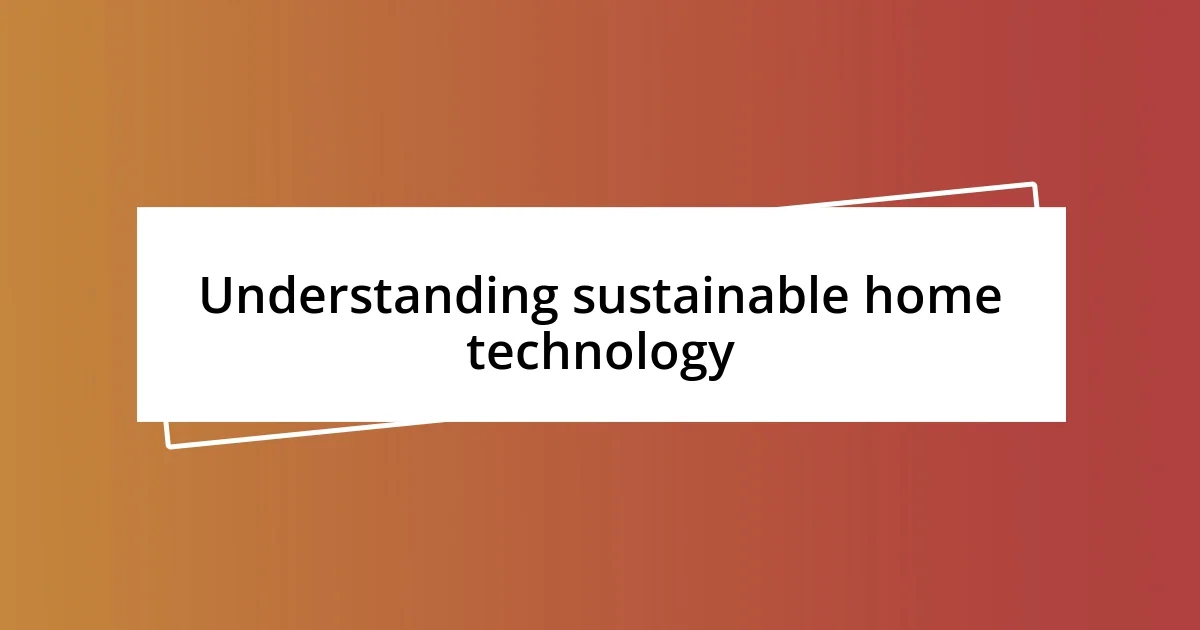
Understanding sustainable home technology
Sustainable home technology refers to innovative tools and systems that promote energy efficiency and reduce environmental impact. I’ve experimented with smart thermostats in my own home, and honestly, it’s like having a little energy-saving assistant that adjusts the temperature based on how I live. Have you ever noticed how little changes can lead to significant savings on your utility bills?
What I find fascinating is how sustainable tech, like solar panels or rainwater harvesting systems, empowers homeowners to take control of their environmental footprint. When I installed solar panels, it felt like I was becoming part of a larger movement towards sustainability, and each sunny day transformed my perception of energy consumption. Isn’t it amazing to think that the sun, a natural resource, can power our daily lives so effectively?
Moreover, incorporating features such as energy-efficient appliances or smart lighting can enhance our living spaces while conserving resources. I remember the first time I switched to LED bulbs; not only did they last longer, but they also cast a warm glow that made my home feel cozy and inviting. Have you considered how these small changes could not only benefit the planet but also enrich your daily experience at home?
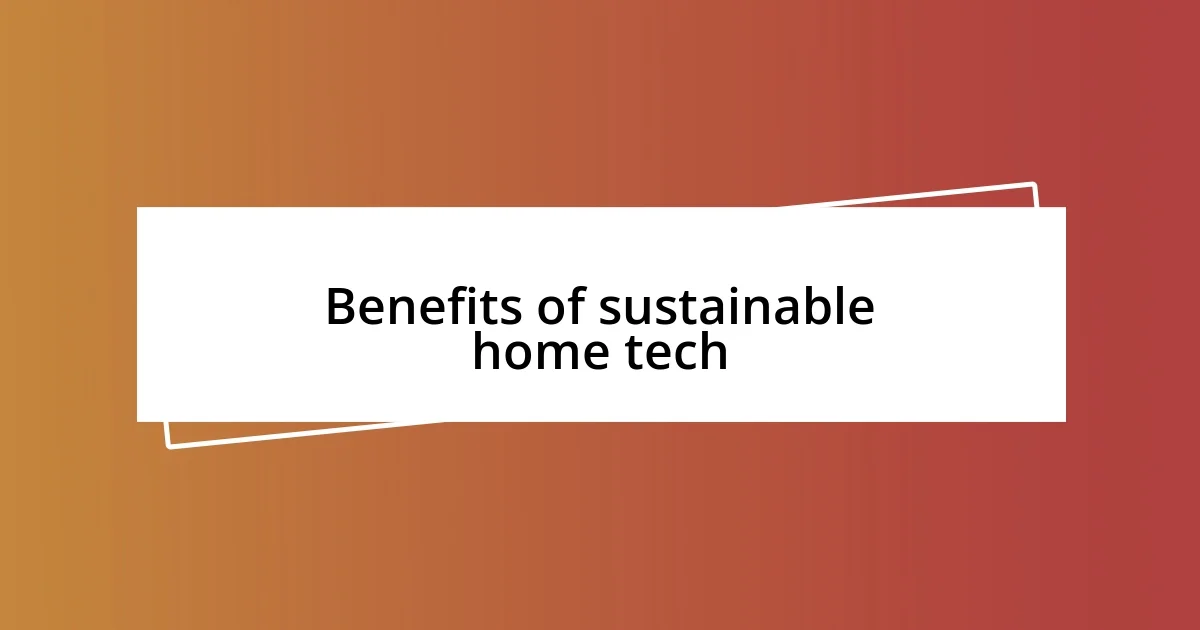
Benefits of sustainable home tech
Sustainable home tech can significantly reduce energy costs, which is something I’ve really come to appreciate. For example, after I set up a programmable thermostat, my energy bill dropped noticeably. It’s like having a personal assistant that not only understands my schedule but also helps me save money—talk about a win-win!
One of the most appealing aspects of sustainable home technology is the positive impact on the environment. When I decided to upgrade to energy-efficient appliances, I was surprised to see how much less energy they used compared to the older models. I felt a sense of pride knowing I was contributing to a healthier environment, and it motivated me to explore even more eco-friendly options in my home.
Lastly, the convenience that these technologies offer enhances our quality of life. I recently installed smart home systems that allow me to control lights and temperature remotely. It’s empowering! I can ensure my home is comfortable before I even walk through the door, all while knowing I’m using resources more efficiently. Isn’t it incredible how technology can seamlessly improve our lives and reduce our carbon footprint at the same time?
| Benefit | Personal Insight |
|---|---|
| Cost Savings | Programmable thermostats lowered my energy bill. |
| Environmental Impact | Energy-efficient appliances make me feel like I’m making a difference. |
| Convenience | Smart home systems allow me to control my environment effortlessly. |
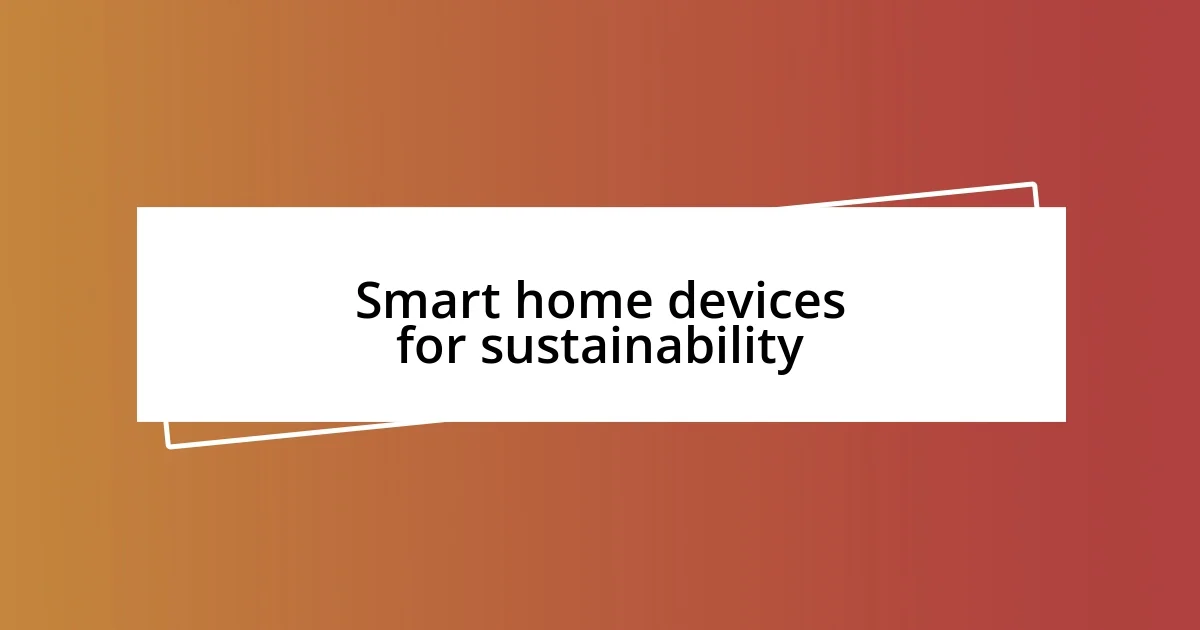
Smart home devices for sustainability
Smart home devices play a remarkable role in enhancing sustainability in our everyday lives. For instance, when I added smart plugs to my home setup, I was amazed at how they helped me monitor energy consumption in real-time. Seeing exact numbers on my screen really drove home the impact of leaving appliances on when not in use. The thrill of turning everything off with just a tap on my phone felt empowering—almost like I had a superpower over my energy usage!
Here’s a quick list of smart home devices that can significantly boost your sustainability efforts:
- Smart Thermostats: Automatically adjust heating and cooling based on your habits, cutting down waste.
- Smart Plugs: Allow remote control and monitoring of devices, ensuring they’re turned off when not needed.
- Smart Lighting: Automatically dims or turns off based on occupancy, reducing electricity usage.
- Energy Monitoring Systems: Track your home’s energy consumption patterns, giving you insights to optimize usage.
- Smart Irrigation Systems: Water your garden efficiently based on weather conditions, conserving water.
I’ve also found that integrating a smart irrigation system transformed my garden routine. I used to struggle with overwatering or forgetting to turn on the sprinklers, which led to a lot of waste. Now, with a little clever technology, it waters on its own and adjusts based on the weather forecast. There’s something deeply satisfying about reaping the benefits of my efforts while being kinder to the environment. It feels like I’m in sync with nature, all thanks to a few smart adjustments at home.
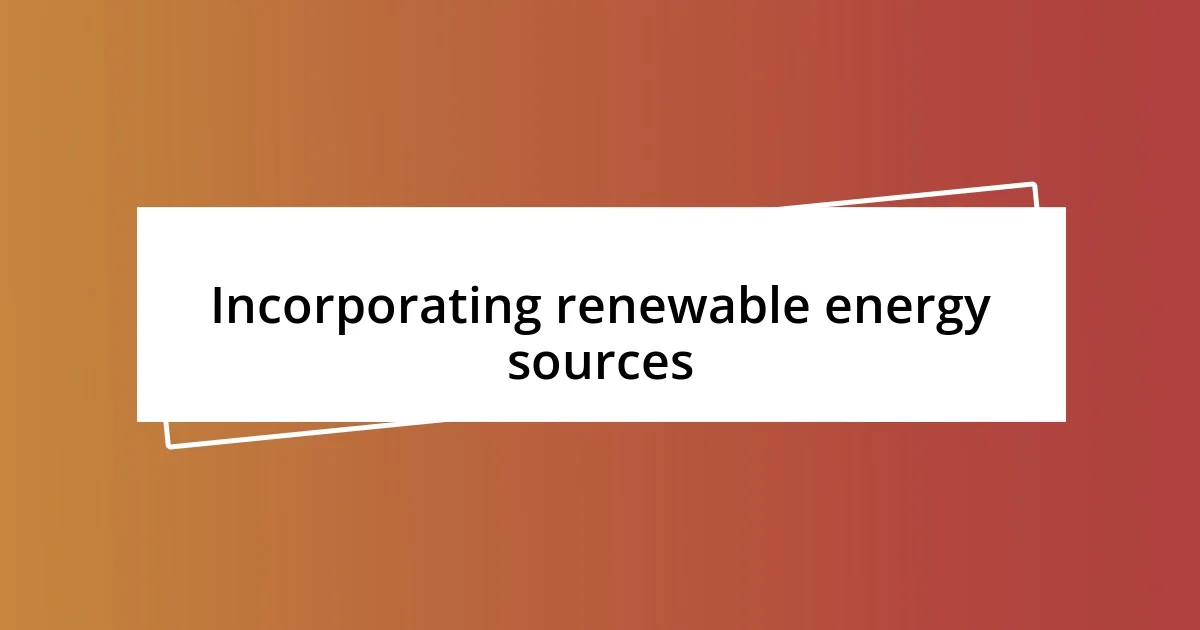
Incorporating renewable energy sources
Incorporating renewable energy sources into my home has been a game-changer. When I installed solar panels on my roof, I didn’t just make a financial investment; I made a commitment to sustainability. Watching the sun convert to energy felt almost magical, and seeing my energy meter spin backwards when the sun shone bright? Let’s just say it brought a smile to my face every time!
I also took the plunge with a small wind turbine in my backyard. Initially, I was a bit skeptical—could a little wind do much? To my surprise, it exceeded my expectations! On windy days, I’d stand outside and watch it spin, feeling like I was harnessing nature’s power for my own needs. It’s invigorating to know that my energy comes from sustainable sources and that I’m not solely relying on the grid. Have you ever thought about how much energy you could generate right from your home?
Integrating these renewable sources has also sparked conversations in my community. Friends and neighbors often stop by to ask about my setup. Sharing my journey and the tangible benefits—like lowered energy bills and the thrill of contributing to a cleaner planet—feels rewarding. I can genuinely feel the shift in mindset, not just for myself but for those around me. It’s like we’re all part of a movement, and I can’t help but wonder: what if more people embraced this lifestyle?

Practical tips for eco-friendly living
When it comes to practical tips for eco-friendly living, I’ve found that starting small can lead to significant changes. I began by swapping out single-use plastic items for reusable alternatives—think stainless steel water bottles and cloth bags. It may sound simple, but each time I refuse a plastic bag, I feel a rush of satisfaction. Doesn’t it feel great to know we’re taking a stand?
Another great shift I made was reorganizing my kitchen to minimize food waste. I started meal planning each week, which not only saved me money but also helped me use up ingredients before they went bad. The tangible benefits became clear—less waste in the trash and a more organized fridge. What about you? Have you ever realized how much food can slip through the cracks simply because it’s not planned for?
Engaging my family in these eco-friendly practices took it to another level. Together, we turned off lights whenever we left a room—something that felt small at first but created a sense of collective responsibility. It became a fun challenge for us! Each time we remembered to unplug devices, I could see the excitement in their eyes as if we were making a game out of saving the planet. Could such simple actions influence those around you as well?










